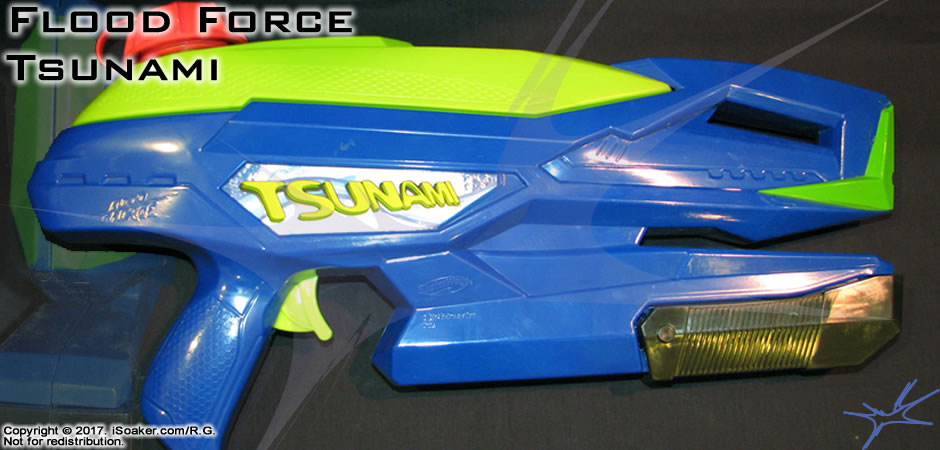





The Flood Force Tsunami is the second largest water blaster made by SwimWays for 2015. It is a pressurized reservoir water blaster with a single nozzle setting. Unfortunately, like its larger brother, the Flood Force Hurricane, the Flood Force Tsunami is another example of how to NOT make an air-pressure-based water blaster.
The Blaster ::
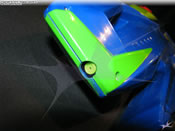 Nozzle ::
Nozzle ::
The Flood Force Tsunami's small nozzle is recessed into the body of the water blaster so that one's initial impression is that it has a larger opening at its front. This is an intentional deception since it requires more effort and more plastic to have a small, recessed nozzle as opposed to having the actual nozzle flush with the front of the water blaster. Stream performance from this nozzle is poor, at best. Though powered from its pressurized reservoir, the rather restricted maximum amount of pressure permitted by the system combined with a long, thin intake tube results in a stream that is arcing significantly within the 10' mark with no significant feel of force from the stream.
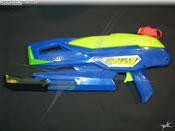 Pump ::
Pump ::
The pump for the Flood Force Tsunami felt slightly better than the Flood Force Hurricane. Nevertheless, the length of each pump stroke is short and the amount of air pushes per pump still did not offer much resistance. Though not accurately counted, an optimally filled reservoir appears to take over 40 pumps to achieve operating pressure. Unforunately, once achieved, the Flood Force Tsunami's pressure relief valve is extremely sensitive, releasing pressurized air and water into the body of the blaster. Also, once activated, the pressure relief valve appears to remain open until the reservoir is nearly completely depressurized. To maintain any level of functional pressure, one must continue to pump air, wasting water through the pressure relief valve, but not doing so results in nearly no stream pressure when one needs it.
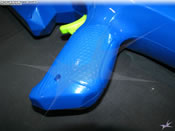 Grip ::
Grip ::
The grip area on the Flood Force Tsunami has a honeycomb texture and is comfortable to hold, though the trigger feels a little stiff and odd, especially since it pivots as opposed to slides. The pump grip is less textured and may feel somewhat slippery when wet.
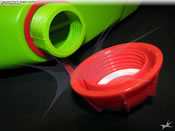 The Reservoir ::
The Reservoir ::
The reservoir on the Flood Force Tsunami holds a decent amount of water for a water blaster this size, but is unable to adequately use it due to a poor pump design, overactive pressure relief valve, and sub-optimal tubing to feel its small nozzle opening. On the bright side, the semi-transluscnet nature of this reservoir makes it a little easier to determine how much it has been filled (or emptied). The tethered cap is functional, though its external ridges are a little sharp.
Overall ::
While we had hoped that the Flood Force-brand of pressurized water blasters would offer another good alternative to the pump-action Nerf Super Soakers of 2015, after testing the two largest of their pressurized water blasters, this is definitely not the case. In fact, the Flood Force Tsunami, together with the Flood Force Hurricane, now serve as good examples of how bad pressurized water blasters can be. With its low pump volume, over-active pressure relief valve, long intake tube, and small diameter nozzle, the Flood Force Tsunami can barely hold its ground against trigger-based water blasters. Forget about going against any decent pump-action water blaster and prepare to be utterly drenched by a properly configured pressurized water blaster. This water blaster is best used for loaning out to one's opponents if they are naive enough to be fooled by its size. If you were considering this water blaster for your own use, save yourself money and frustration and pick something else. Almost anything else will do better!
Pros
Has a tethered reservoir cap.
Cons
Reservoir cannot be pressurized well (unable to attain better performance due to overactive pressure relief valve); small nozzle compounds its poor output and range problems; pressure relief valve dribbles a LOT of water into the body of the water blaster; takes a lot of pumps to build and maintain pressure; short pump stroke; this is one water blaster that may have better off were it pump-action instead of pressurized!
Related Content .:
Product Listing Page
Additional Resources
Water Blaster: Basics | Care, Cleaning, and Storage | Soaker Use: Basics|Repair Articles

 :: Flood Force Tsunami
:: Flood Force Tsunami












